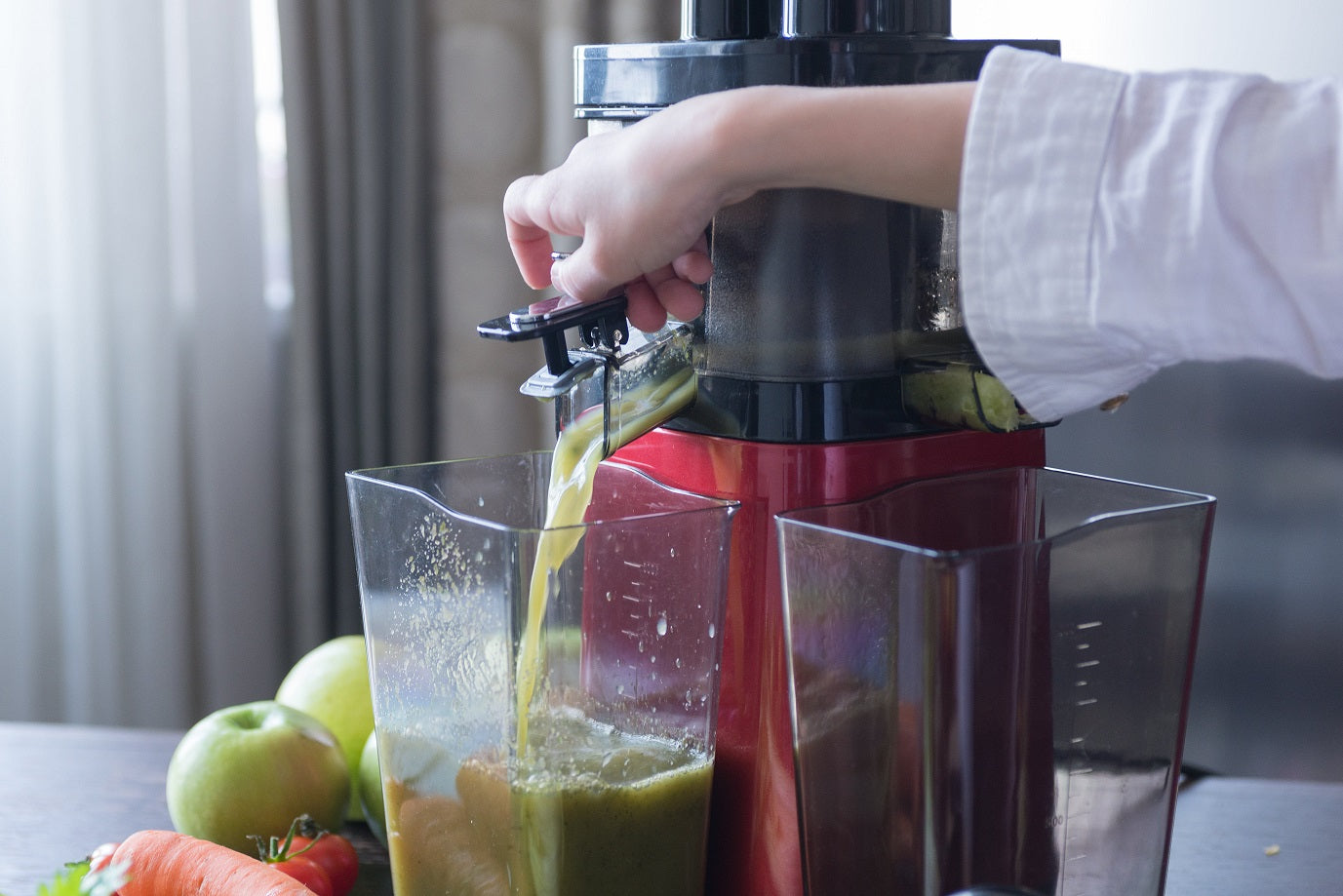There are two main types of juicers on the market: cold press juicers and centrifugal juicers (the ‘normal’ kind of juicer). When on the market for new appliances, consumers often have difficulty choosing between the two options, given their apparent similarity in function and design. In reality, there is a big difference between a cold press juicer and a normal juicer.
To help find the right option for you, the team at Webky have compiled a detailed breakdown of features for the cold press juicer vs the normal juicer.
Cold Press Juicer vs Normal Juicer
Here is a brief overview of what’s the differences between these two types of juicers:
- Cold press juicers extract juice from vegetables, fruits and leafy greens using a slow, gentle pressing motion via hydraulics. This applies significant pressure to the cell walls of the produce, releasing their nutrients and enzymes. Normal, centrifugal juicers, however, use a fast-spinning blade to chop up fruits and vegetables and extract the juice.
- Cold press juicers preserve more of the nutrients in fruits and vegetables since they are not exposed to heat during the juicing process. Normal juicers can damage some of the nutrients in fruits and vegetables due to exposure to heat from the spinning blade.
- Cold press juicers typically have a higher yield than centrifugal juicers, meaning that more juice is extracted from the produce.
- Cold press juicers typically require more clean-up than normal juicers since there are more parts that need to be washed.
What’s the Benefit of a Cold Press Juicer vs Normal Juicer?

There are many benefits of cold press juicing, including:
Higher nutrient and enzyme content
Because cold press juicers extract more nutrients from the produce, the juice is more nutrient-dense. This means that you are getting more vitamins, minerals, and enzymes in each sip.
Greater antioxidant content
Antioxidants are important for fighting cell damage and protection against disease. Cold press juicing preserves more of the antioxidants found in fruits and vegetables, making for a healthier juice.
Fresh taste
Cold press juicing results in a fresher tasting juice because the nutrients are not exposed to heat during the juicing process. Heat can break down some of the delicate flavours and nutrients found in fruits and vegetables.
Longer shelf life
Cold press juice can be stored for longer than juice made with other methods as it does not contain as many oxygen molecules. Oxygen can cause the juice to spoil more quickly.
More vitamins and minerals
Cold press juicing preserves more of the vitamins and minerals found in fruits and vegetables, too. This means that you are getting a more nutrient-rich juice when you cold press.
Less foam
Because cold press juicers do not create as much friction as a normal juicer, there is less foam in the final product. This results in a clearer juice that is less pulpy.
Slow juicing
Cold press juicers typically have a slower juicing speed, which allows for a more thorough extraction of nutrients. This results in a higher quality juice to enjoy.
Greater yield
Cold press juicers typically have a higher yield than other types of juicers, meaning that more juice is extracted from the produce. This also results in a more cost-effective juice since you are getting more juice per fruit or vegetable.
What’s the Disadvantage of a Cold Press Juicer vs Normal Juicer?
Despite the long list of benefits mentioned above, there are a few downsides to a cold press juicer when we analyse the difference between a normal juicer. These include:
Higher price tag
A cold press juicer can be more expensive than a normal juicer given the technology involved, however, there is an argument that money can be saved with the higher yields produced.
Slow juicing
Cold press juicers have a slower juicing speed, which is great for quality, but does mean it takes longer to make a batch of juice. If you are in a hurry, this may not be the best option for you.
Requires pre-cutting
Many cold press juicers require that you pre-cut your fruits and vegetables into smaller pieces before juicing. This extra step can also be time-consuming.
Limited to certain fruits and vegetables
Some cold press juicers can only handle certain types of fruits and vegetables. If you want to juice leafy greens or hard fruits and vegetables, you may need to look for a different type of juicer.
Requires more clean-up
Cold press juicers typically require more clean-up than other types of juicers since there are more parts that need to be washed. Again, if you are frequently short on time, this may not be the best option of the two.
Now We Know the Difference Between Them, What’s the Best Type of Juicer for Me?
The type of juicer that is right for you depends on your individual preferences. If you are looking for a juicer that preserves more of the nutrients in fruits and vegetables, then a cold press juicer may be the best option for you. However, if you are looking for a fast and easy way to make juice that is still delicious and healthy, then a centrifugal juicer may be a better choice. Ultimately, when deciding between a cold press juicer vs normal juicer, it is best to understand what’s most important in terms of your needs and budget, and then review how their differences fit into that list.
Find Your Next High-Quality Cold Press or Centrifugal Juicer Online with Webky Today
At Webky, we have a wide range of home appliances, tools and accessories available, including cold press and normal juicers from some of the leading brands in the industry, such as Kuvings, Braun, Nutribullet and more. Browse our selection today, or if you would more information to better understand what’s the difference between a cold press juicer vs a normal juicer, please feel welcome to contact us directly.

